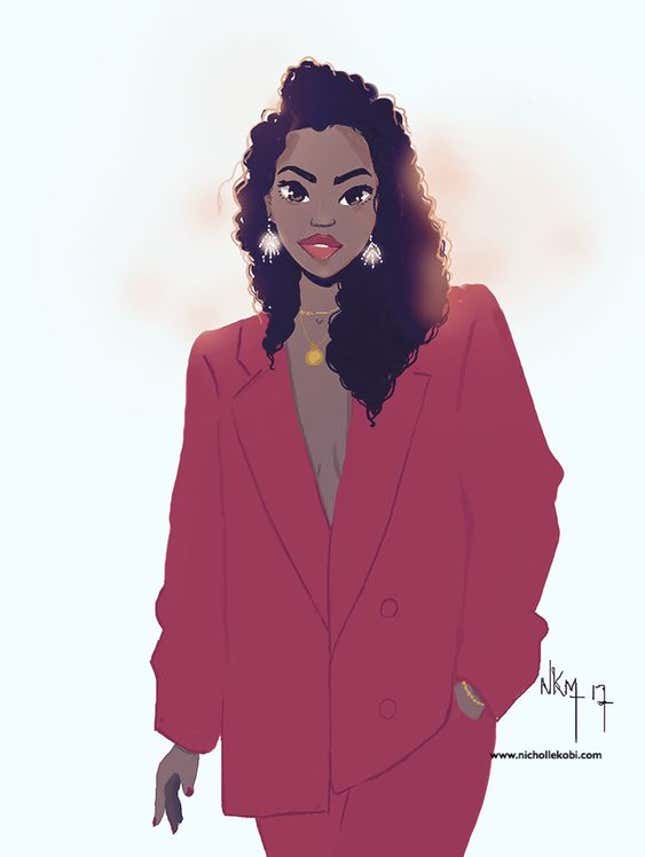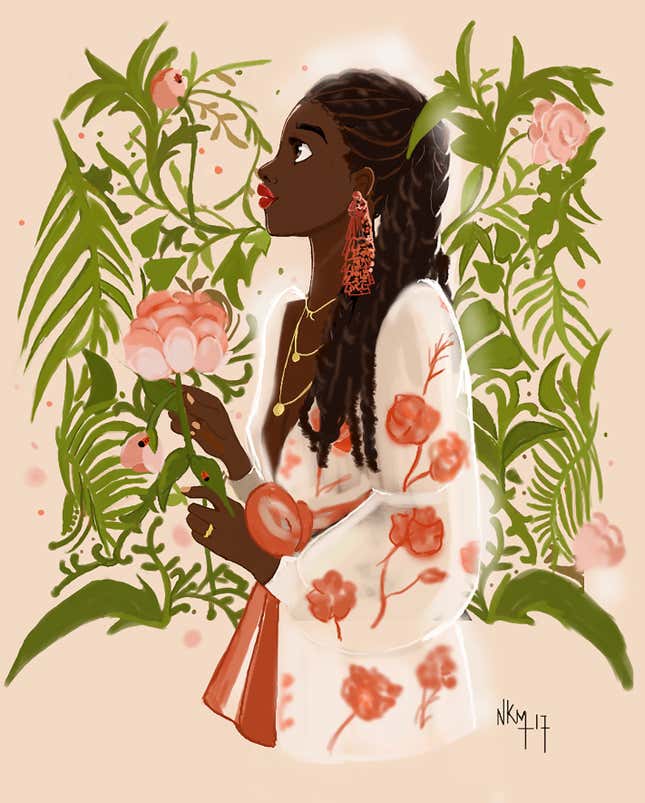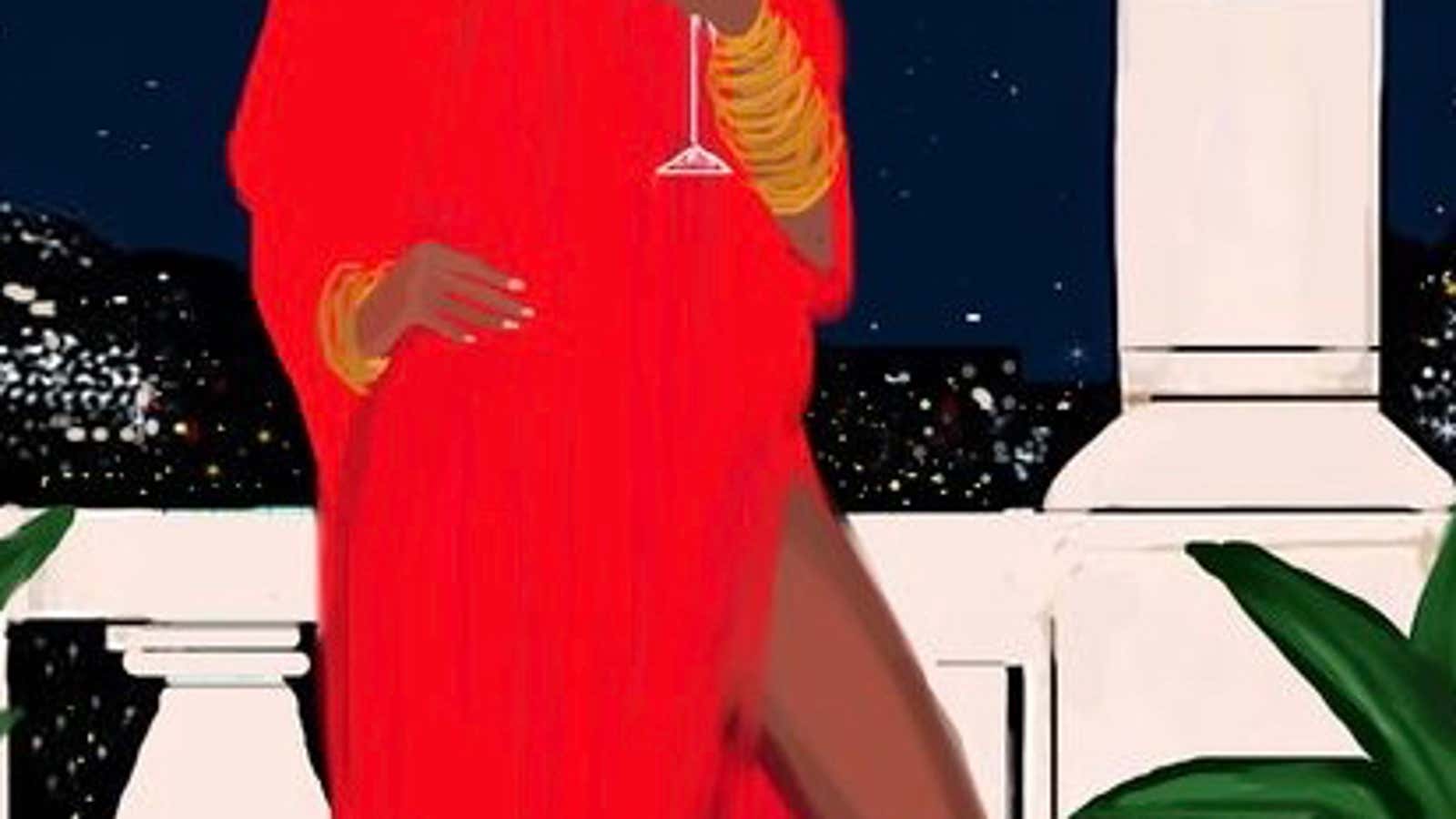A meet-and-greet with illustrator Nicholle Kobi is titled A Parisian Instant, yet at home the French illustrator is overlooked. This, even as her work spreads from Instagram to communities of black women around the world, this week in Johannesburg.
Kobi’s work has become something of a cultural phenomenon among women in the African diaspora. The popularity of her illustrations of black women in all their variations is a testament to the power of representation in our visually-driven online culture.

In much the same way many of her fans came to discover her work, Kobi too used to follow illustrators and artists online. She was always frustrated by the lack of diversity, even resorting to the comments section to question why there were so few images of black women. When there were illustrations of black women, Kobi found that they fell into uncomfortable stereotypes or a flat interpretation of a very diverse, but ignored sector of the population. Eventually she took it upon herself to change that
“I decided, let’s do black women how I saw them, how they really are,” she said.
Kobi’s art history teacher once told her to get a job in corporate because she would never work drawing only black women. So she listened and spent a decade working in a bank and sketching all over contracts. Frustrated with a long maternity leave due to illness, Kobi began to draw as an outlet while she was confined to her home. So she did what makes her happy: drawing black women. Her focus on black women specifically comes from the need to authentically represent her world, and celebrate it.
“It’s easy to criticize black women, because of our hair, our skin, we are never enough,” she says, explaining that her images are meant to positively reinforce the popular image of black women.

Kobi, 38, was born in Kinshasa but grew up in Normandy, where she was a minority aware of her difference. It was in cosmopolitan Paris, however, where she really came to understand racism and the exclusion of black people in French society. Here she was faced with all the stereotypes and limitations placed on black Parisians.
Kobi felt it particularly in her social circles. Moving through the city, she felt pressured into groups where there was only ever one black person. It’s an experience people of color know well, a sort of false diversity that only has room for one non-white, whether it’s in the office or at the dinner table.
“I didn’t want to be the good black Parisian,” Kobi told Quartz.
She also felt that pressure in her romantic relationships, where her decision to marry a black man seemed at odds with an unspoken convention that upwardly mobile Parisians of color marry outside of their race. A black woman, having a group of black friends and a black husband in Paris “feels like a big deal,” she explains.
Her illustrations often highlight positive relationships between black people. She draws surprisingly intimate pictures of black couples just sitting on a couch. Some of her most popular images are of groups of chic black women, with diverse skin tones and hairstyles. Kobi is acutely aware of the false divisions within the black community based on colorism, so it was important for her to represent this diversity.
Perhaps her most controversial images are of black women with the Eiffel Tower in the background. Just as the group of black actresses who staged a protest at Cannes for greater representation, or the debates sparked by the ethnicity of the World Cup-winning football team, embracing an identity that is both black and French remains fraught for many.
“Black people in Paris are not ready to be black,” she says. It’s why, she adds, the French word for black, noir, has not been embraced by the country since it still holds so many negative connotations. Instead, it’s easier to embrace an Americanization, using the English black, as in Les Blacks.
In Paris, the crowds Kobi attracts are far smaller than in cities like New Orleans or Johannesburg and she’s never been able to get work in France. Some have gone as far as calling her work racist because she only draws black women, without applying the same criticism to illustrations that only feature white people.

Yet, while France still struggles to embrace Kobi’s work, she has been welcomed in Brazil, the United Kingdom, United States and now South Africa. Francophone Africa, she says, has been slow to respond to her work. This she believes is due to the French colonial legacy. This growing profile outside of her country has emboldened Kobi to tackle more political issues, like drawing in honor of Afro-Brazilians who are disproportionately affected by police violence.
Thanks to the internet Kobi has found an new community. This year, she left Paris for Harlem, once the epicenter of black art. Her illustrations have evolved into home-deco products, clothing and stationary under her studio Maison Nicholle Kobi.
Sign up to the Quartz Africa Weekly Brief here for news and analysis on African business, tech and innovation in your inbox
